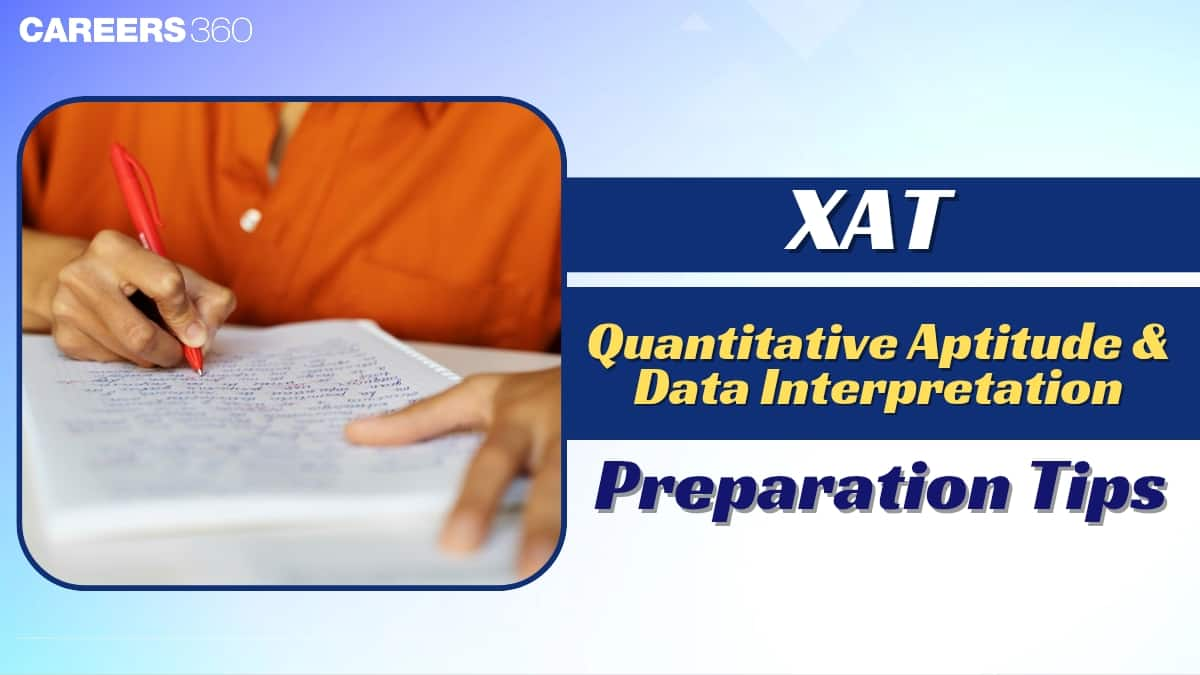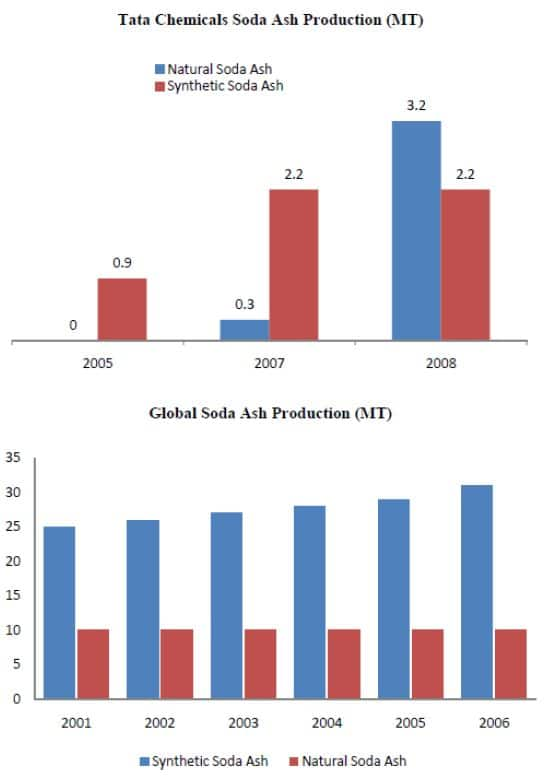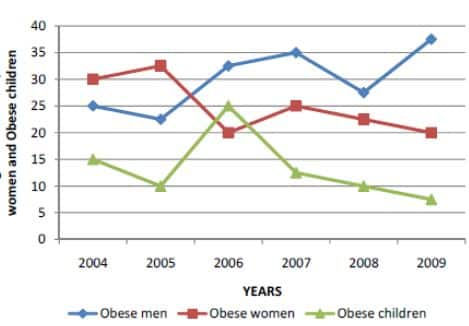BIMTECH PGDM Admissions 2026
AACSB Accredited | Highest CTC: 22 LPA
XAT 2026 QA & DI Preparation Tips: The Xavier Aptitude Test (XAT) is regarded as one of the most challenging MBA entrance exams in India. The Quantitative Aptitude and Data Interpretation sections are crucial components of this exam. These two sections carry a lot of marks in your final score. Almost one-third of all questions come from these two sections combined. Many students want to know the best way to prepare for the XAT Quantitative Aptitude and Data Interpretation sections. This article will share XAT 2026 preparation strategies for the Quant and DI sections.
This Story also Contains

In this article of careers360, you will find information about XAT Quantitative Aptitude Preparation Tips for 2026, Common Challenges in XAT Quant Preparation and How to Overcome Them, Data Interpretation Strategy for XAT 2026, XAT Quantitative Aptitude Syllabus: What to Expect in 2026, and Sample Questions for XAT Quantitative Aptitude and Data Interpretation.
To perform well in any type of exam, preparation is the key to success. Here are some XAT Quantitative Aptitude preparation tips for the upcoming 2026 exam.
Some of the common challenges students face during the XAT quant preparation are:
Having a data Interpretation Strategy for XAT 2026 is very crucial to excel in this section.
Data interpretation questions mostly come from the topics below.
Ranked among top 10 B-Schools in India by multiple publications | Top Recruiters-Google, MicKinsey, Amazon, BCG & many more.
Highest Package 27.25 LPA | Top 100 Average package 16.65 LPA | AACSB Accredited | Ranked 52 by QS International
Constant practice plays a crucial role in mastering DI skills. Solving XAT exam Data Interpretation practice questions will help you get more familiar with the types of questions.
Before appearing in any exam, understanding the syllabus in detail is very important. You can then prepare accordingly and be ready for the exam.
Various types of questions from the Quant section come in the XAT exam.
Some of the most essential quant topics are given below. Dedicated XAT preparation on these topics can be very beneficial for the candidates.
Important topics in the Quantitative aptitude section are:
Here are some tips and tricks for cracking the XAT 2026 exam. These XAT Quant tips and tricks will simplify calculations and prepare you for the exam.
| Formula Name | Formula |
|---|---|
| Simple Interest | |
| Compound Interest | |
| Area of Circle | |
| Circumference of Circle | |
| Speed, Distance, Time | |
| Profit | |
| Loss | |
| Profit Percentage | |
| Loss Percentage | |
| Percentage | |
| Average | |
| Quadratic Equation (Roots) | |
| Permutations | |
| Combinations | |
| Logarithmic Rule (Product) | |
| Logarithmic Rule (Quotient) | |
| Logarithmic Rule (Power) |
Choosing the best books for XAT Quantitative aptitude preparation is very important. Good books cover a wide range of topics and concepts. These will help students prepare for the exam.
Some of the recommended best books for XAT Quantitative Aptitude and DI are:
Here are the names of some practice resources for XAT Quant and Data Interpretation.
XAT Data Interpretation Tips involve quick thinking, fast calculations, and understanding the trends and patterns. To excel in DI, it is essential to understand the types of questions asked and employ effective strategies to solve them efficiently.
A good understanding of percentages, ratios, and averages will help you calculate more efficiently.
Some of the essential formulae are:
Average | The sum of n observations / n |
Weighted average | The sum of the weighted terms / Total number of terms |
Profit percentage | [(Selling price - Cost price) / Cost price] × 100 |
Loss percentage | [(Cost price - Selling price) / Cost price] × 100 |
Discount percentage | (Discount amount / Marked price) × 100 |
Percentage change | [(New value - Old value) / Old value] × 100 |
Ratio | Value of A / Value of B |
Proportion when comparing two ratios | A / B = C / D |
Due to the complexity and variety of questions in the Quantitative Aptitude and DI sections, most of the time is spent on these sections in the exam. So, an effective time management strategy is necessary for these sections.
The total time length of the XAT exam is 175 minutes with no sectional time limit.
Give a total of 100-105 minutes in the QA and DI sections combined.
Revise both sections for 10-15 minutes and complete the complex questions you left earlier.
Mental endurance is essential in time-based exams.
Constant strategic practice is the key to success in the XAT Quantitative Aptitude and Data Interpretation section.
At the beginning of the preparation, make a list of topics in which you are strong and topics in which you need more practice. Then choose one strong and one weak topic every day to study.
Here is a weekly routine you can follow.
Day 1: Morning- Arithmetic; Evening- Probability
Day 2: Morning- Algebra; Evening- Permutations & Combinations or progressions (Alternate weeks)
Day 3: Morning- Geometry; Evening- Mock test
Day 4: Morning- Analyse the mock test; Evening- Number system
Day 5: Morning- Mensuration; Evening- Logarithm or Surds & Indices (Alternate weeks)
Day 6: Morning- Arithmetic and Data sufficiency questions; Evening- Mock test
Day 7: Morning & Evening- Review and revision
Some of the best online platforms for practising XAT quant and DI questions are:
Some of the well-known YouTube channels for practice are:
QA and DI sections hold significant weightage in your overall percentage. Almost 1/3 of the questions come from these two sections. 15-16 questions come from the QA section, and the DI section has 12-13 questions. So these sections required our exceptional attention to secure good marks in the overall XAT 2026 exam.
Year of the exam | Number of Quantitative Aptitude questions |
2020 | 21 |
2021 | 19 |
2022 | 21 |
2023 | 22 |
2024 | 17 |
From the trend, we can see the weightage varies from 70-80% of the total (QA + DI) section. The difficulty level of the questions is moderate to hard.
Year of the exam | Number of Data interpretation questions |
2020 | 6 |
2021 | 9 |
2022 | 7 |
2023 | 6 |
2024 | 11 |
From the trend, we can see the weightage varies from 20-30% of the total (QA + DI) section. The difficulty level of the questions remains moderate to hard.
Students often make common mistakes in the XAT QA section. Here are those mistakes and some ways to avoid them during the exam.
Here are some tips to minimise calculation mistakes in the XAT exam.
Build strong concepts in Arithmetic, Algebra, and Geometry. Having a clear understanding of these topics will enable you to approach questions with confidence. Here are some more tips to build more confidence in the Quant section.
Mock tests are prepared based on the latest exam patterns and syllabus, so students can get an idea of what to expect. So mock tests play a vital role in preparing students for the XAT exam.
Do not give random mock tests. It is preferable to invest time in mock tests prepared by good sites.
Here are the names of some sites where you can practice mock tests for the XAT QA and DI sections.
Here are some sample QA and DI questions that came in previous years' exams.
Here are some examples of Quantitative aptitude questions that have appeared in previous years.
Q1. The cost of running a movie theatre is Rs. 10,000 per day, plus an additional Rs. 5000 per show. The theatre has 200 seats. A new movie was released on Friday. There were three shows, where the ticket price was Rs. 250 each for the first two shows and Rs. 200 for the late-night show.
For all shows together, total occupancy was 80%. What was the maximum amount of profit possible?
Answer:
Total expense in a day = 10000 + (5000 × 3) = 25000
For all shows together, total occupancy was 80%.
So, total seats filled = (200 + 200 + 200) × 80/100 = 480
As the ticket price of the first two shows is higher, so to gain maximum profit, we assume the first two shows were full.
Total ticket selling price for two shows = (200 + 200) × 250 = 100000
In the last show, the remaining seats i.e., (480 - 400) = 80 seats were filled.
Total ticket selling price for the last show = 80 × 200 = 16000
So, total income = 100000 + 16000 = 116000
Profit = 116000 - 25000 = 91000
Hence, the correct answer is 91000.
Q2. A king has distributed all his rare jewels in three boxes. The first box contains 1/3 of the rare jewels, while the second box contains k/5 of the rare jewels, for some positive integer value of k. The third box contains 66 rare jewels.
How many rare jewels does the king have?
Answer:
Let the total jewels be x.
According to the question,
x - x/3 - xk/5 = 66
⇒ (15x - 5x - 3kx) / 15 = 66
⇒ 10x - 3kx = 66 × 15 = 2 × 32 × 5 × 11
k is a positive integer.
Taking k = 1, we get the value of (10 - 3k) to be 7, which is not present on the right-hand side.
Taking k = 2, we get the value of (10 - 3k) to be 4, which is again not present on the right-hand side.
Taking k = 3, we get the value of (10 - 3k) to be 1, which is possible on the right-hand side.
i.e., 10x - 9x = 66 × 15
⇒ x = 990
Taking any other values of k will give a negative value of (10 - 3k), which is not possible.
Hence, the correct answer is 990.
Here are the examples of some Data Interpretation questions which came in the previous years.
Q1. Direction: Analyse the graph/s given below and answer the question that follows.
Sodium carbonate, also called soda ash is an important ingredient for glass, soaps, detergents, and many other products. There were two ways of producing soda ash. The first is producing soda ash from trona obtained naturally. The second method was producing soda ash from common salt through the Solvent process. The soda ash produced thus was called synthetic soda ash. Tata Chemicals was one of the largest producers of soda ash. Given below are two charts-first chart shows the production of two varieties of soda ash at Tata Chemicals. The second chart shows the production of varieties of soda ash in the world.

It was expected that global soda ash production would be the same for 2006, 2007 and 2008 (only for this question). What could be a possible reason for different patterns of production in Tata Chemicals and the world?
Correct Answer:- Option (B)
Explanation:-
The possible reasons for different patterns could be that either Tata Chemicals built 3.2 MT of natural soda ash capacity or it has acquired one or more companies in the given period.
Q2. Directions: Analyse the graph/s given below and answer the question that follows.
Percentage of Obese men, Obese women and Obese children in a state in various years

Total Number of Men, Women and Children in the state over the years

What is the difference between the number of obese women and obese children together in the year 2006 and the number of obese men in the same year?
Correct Answer:- Option (A)
Explanation:-
In the year 2006, obese Women & obese Children
= 20% × 60000 + 25% 12000
= 12000 + 3000
= 15000
In the year 2006, obese men
= 32.5% of 63000
= 20475
So, Required difference = 20475 - 15000 = 5475
As the XAT exam is getting near, it’s important to focus on revising key concepts, practising efficiently, and keeping your mind calm. Here are some last-minute tips to perform better in the XAT 2026 exam.
Students need to remain calm and composed during the final week leading up to the exam. Most of the preparation is already done, so there’s no need to panic. Use this time for focused revision and a quick review of key formulae. As suggested in the XAT section-wise preparation strategy from experts and toppers, this phase is all about reinforcement, not learning new concepts.
Aim to take 4–5 mock tests during the final week. Consistently good scores can boost your confidence before the actual exam. Resources like How to Prepare for XAT in One Month and XAT Last Minute Tips and Exam Day Guidelines offer practical insights to manage this phase efficiently.
Before the exam, revise only essential topics, stay away from stress, and get a good night’s sleep. Being mentally refreshed is crucial. Don’t forget to go through the XAT Essay Writing Tips and Strategy to handle the writing section with ease.
Frequently Asked Questions (FAQs)
XAT 2026 exam is expected to have 95 MCQs this year divided into four sections: Decision Making, Verbal and Logical Ability, Quantitative Aptitude and Data Interpretation, and General Knowledge.
No, don't attempt all questions. XAT has negative marking, so attempt only those questions with which you are confident. Aim for 18-20 attempts with high accuracy.
The most important topics are arithmetic (percentages, profit-loss, time-work), algebra, geometry, and number systems. These topics appear in almost every XAT exam.
Though XAT and CAT cover similar quant topics, questions in the XAT exam are more challenging. These questions require higher problem-solving skills and efficient techniques. Additionally, Data Interpretation and Decision-Making sections are included in the XAT exam syllabus, unlike CAT.
No, calculators are not allowed in the XAT exam. Students have to rely on traditional approaches and mental math-solving techniques to answer questions.
Yes. There is a negative marking of 0.25 for every wrong answer in the XAT Quant and DI section. Additionally, 0.10 marks per question will be deducted beyond 8 unattempted questions.
On Question asked by student community
You can find all the information here:
CAT- https://bschool.careers360.com/articles/cat-exam-dates
SNAP- https://bschool.careers360.com/articles/snap-exam-dates
You can check the XIMB XAT Cutoff 2026 to determine the percentile for non-domicile female candidates.
The IRMA XAT 2026 cutoff is expected to be in the range of 55 to 60 percentile for ST category candidates. At an XAT score of 47 percentile, it is unlikely to get a PI call for the IRMA MBA admission 2026.
Assuming the candidate is from the general category with a decent academic profile, sectional scores, and work experience can get PI calls from XLRI, Jamshedpur, XIMB, GIM, Goa, SPJIMR, and more. You can refer to XAT college predictor for more information.
IMT Ghaziabad XAT 2026 cutoff varies in the range of 85-90+ percentile. You may get a PI call from IMT Ghaziabad, depending on your academic profile and category. For more information, you can refer to the XAT 2026 cutoff .
Ranked among top 10 B-Schools in India by multiple publications | Top Recruiters-Google, MicKinsey, Amazon, BCG & many more.
Application Deadline: 10th March | Globally Recognized by AACSB (US) & AMBA (UK) | 17.8 LPA Avg. CTC for PGPM 2025
Industry Internship Training
NAAC A++ Accredited | Ranked #12 by NIRF
Last Date to Apply: 28th Feb | Ranked #36 amongst institutions in Management by NIRF | 100% Placement
MBA Admissions Deadline 28th Feb'26 | UGC Approved Programs | Near 100% Placement Record | Up to 100% Scholarships | Highest CTC 21.32 LPA